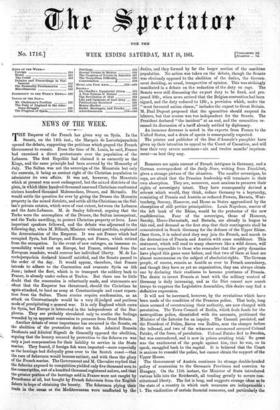NEWS OF THE WEEK.
THE Emperor of the French has given way on Syria. In the Senate, on the 14th inst., the Marquis de Larochejaquelein opened the debate, supporting the petitions which prayed the French Government to remain. From the time of St. Louis, he said, France had exercised a direct protectorate over the population of the Lebanon. The first Republic had claimed it as earnestly as the Kings, and the same principle had been avowed by the Monarchy of July. The Sultan was not the sovereign of the Mountain but only the suzerain, it being an ancient right of the Christian population to administer its own affairs. It was not, however, the Mountain which at present was most endangered, but the mixed districts of the: plain, in which three hundred thousand unarmed Christians confronted sixteen hundred thousand Mahomedans, Erases, and Metualis. He would settle the question for ever by giving the Druses the Maronite property in the mixed districts, and settle all the Christians on the tan's private estates, which were of vast extent, between the Lebanon and the Ante-Lebanon. M. de Sanley followed, arguing that the Turks were the accomplices of the Druses, the Sultan incompetent, and the Turks unwilling, to protect Christian property or lives. Less important speakers followed, and the debate was adjourned to the following day, when M. Billault,4inister without portfolio, explained the determination of the Emperor. It was not France which had occupied Syria, but Europe, and Europe, not France, which retired from the occupation. In the event of new outrages, an immense re- sponsibility would rest on Europe, but France, released from the European mandate, would recover her individual liberty. M. de La- rochejacquelein declared himself satisfied, and the Senate passed to the order of the day. It would appear, therefore, that France intends to adhere to the Convention and evacuate Syria on 5th June ; indeed the fleet, which is to transport the soldiery back to France, is already under orders at Toulon. But there can be little doubt that the concession is reluctantly made, and statements are afloat that the Emperor has threatened, should the Christians be again attacked, to land an army at Constantinople and exact repara- tion from the Sultan. These stories require confirmation, as an attack on Constantinople would be a very ill-judged and perilous mode of precipitating a general war. It is only England which cares' for Syria, but Europe is interested in the independence of the Bos- phorus. They are probably circulated only to soothe the feelings wounded by an apparent concession to pressure from Great Britain.
Another debate of some importance has occurred in the Senate, on the abolition of the protective duties on fish. Admiral Romain Desfosses and Admiral Rigault de Genonilly opposed the abolition, arguing that the bounty secured by protection to the fishermen was only a just compensation for their liability to service in the State marine. They feared, if foreign fish were imported—more especially as the herrings had disloyally gone over to the Scotch coast—thit the race of fishermen would become extinct, and with thern'the glory of the French marine. The Government and M. Chevalier replied that the fisheries exposed to competition yielded only five thousand men to the conscription, out of a hundred thousand registered sailors, and that the greater portion of the herrings sold in France were not caught by Frenchmen at all, but bought by French fishermen from the English fishers in hope of obtaining the bounty. The fishermen plying their trade in the ocean or the Mediterranean were unaffected by the duties, and they formed by far the larger section of the maritime populatien. No action was taken on the debate, though the Senate was obviously, opposed to the abolition of the duties, the Govern- ment deciding, as usual, irrespective of opinion. This was strikingly manifested in a debate on the reduction of the duty on rags. The Senate were still discussing the ex port duty to be fixed, and pro- posed 30fr., when news arrived that the Belgian convention had been signed, and the duty reduced to 12fr., a provision which, under the " most favoured nation clause," includes the export to Great Britain. M. Paul Dupont proposed that the committee should suspend its labours, but that course was too independent for the Senate. The President declared "the incident" at an end, and the committee re- sumed its discussion of a tariff already settled by diplomacy.
An immense decrease is noted in the exports from France to the United States, and a drain of specie is consequently expected.
The printer and publisher of the Due d'Aumale's pamphlet have given up their intention to appeal to the Court of Cassation, and will bear their very severe sentences—six and twelve months' imprison- ment—as best they may.






























